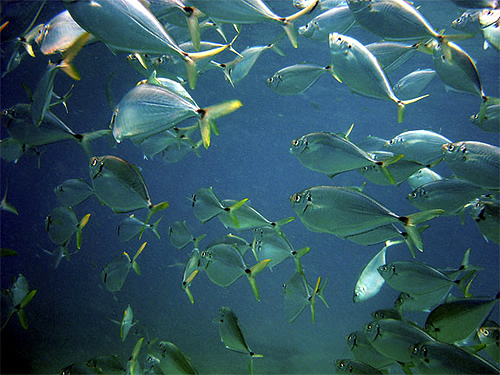The Atlantic and the Pacific bumper are two of the smaller members of the jack family. Both species have not been greatly studied, and there is some speculation that they may be the same.
Identification
Although the bumper doesn’t have a high back, it has an extended belly and a very thin body. With an overall silvery coloring, it has greenish tints on the back and yellow highlights on the sides and the belly. It also has a yellowish tail. There is a black spot on each gill cover and a
black saddle on the base of the tail.
Size
Bumper rarely weigh more than half a pound and can reach a length of 10 inches in the western Atlantic or 12 inches in the eastern
Atlantic.
Life history/Behavior
Small bumper have been observed in offshore waters, but they frequently range along sandy beaches. They travel in extensive schools, and juveniles are often found in association with jellyfish.
Other Names
French: sapater; Spanish: casabe.
Distribution
In the western Atlantic
Ocean, Atlantic bumper are found north to Massachusetts, off Bermuda and south to Uruguay, as well as in the Caribbean Sea and the Gulf of Mexico. Bumper are said to be absent from the Bahamas and the Caribbean. The Pacific bumper ranges from Peru to
California.
 |
| A school of Atlantic bumpers |
Habitat
Inhabiting brackish and saltwater, bumper occur over soft bottoms in shallow
water. They are common in bays, lagoons, and estuaries.



